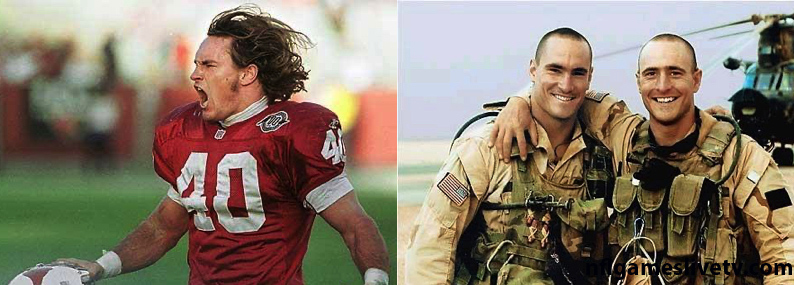Patrick “Pat” Tillman is remembered for being part of two of the most respected communities in America: the NFL and the Military. Although if Tillman had not had a fleeting step through the grills, probably today the world would not even know who he is and would be one more casualty of the US army, like thousands of others. His quest for heroism caused him to cut short a promising career in football and he only met his death at the age of 27.
Pat Tillman, the player who left the NFL millions to die in the war at age 27

Tillman was one of many cases where patriotism lured him to a place less safe than the playing field; in one scenario he ran to stop his rivals, in the other he had to run to save his own life. Despite his short stature for his position (1.80), Tillman’s qualities quickly began to attract attention, although for many others, he was a player with an insufficient size, augury that his continuity could not make a leap to professionalism.
Tillman was aware that his work would be the only one that could put him to compete among the most outstanding. Bill Belichick, the head coach of the Patriots and who was able to meet Pat in some tests, described him as an extremely intelligent person and who had the basic qualities that his position required.
In the same generation in which Payton Mannig was selected by the Indianapolis Colts, Tillman had to wait for 225 players to be selected before him and it was until the seventh round that he was chosen by the Arizona Cardinals. He was an out-of-the-ordinary rookie. He would arrive at his workouts by bicycle and bring books under his arm. But once equipped, it became a kind of care. Tillman’s mentality was what Cardinals coaches needed to inject into the rest of the team.

With intelligence and speed as his best attributes, Pat immediately earned a spot on the Arizona team’s starting roster. Already in their first season in the NFL, Tillman and the Cardinals signed one of their best seasons entering the playoffs. He was a fan favorite. But the rookie’s head was also directed to other aspects, as he declared himself with a patriotic bone and let himself be carried away by the emotion of the pre-match ceremonies.
In the 2000 season, Pat made the best of his campaigns with 144 tackles, of which 107 were alone and 37 assists; 1.5 sacks, two forced fumbles, two recovered fumbles and one interception. The outlook looked favorable for the Californian and contracts of millions were on his table. But the air changed after the attack on the Twin Towers on September 11, 2001. With his previously pronounced patriotic identity, Patrick decided to enlist in 2002 with the United States army, with the task of ending the terrorism that was settling in the Middle East. According to media reports, the former player shelved the Cardinals’ proposal for $3.6 million a year before leaving for the war.
Both Patrick, and his brother Kevin who was also starting a career with the Cleveland Indians of MLB, were named ‘Army Rangers’. At the time, Pat was part of the initial invasion of Iraq and was part of Operation Iraqi Freedom. He would then move to Afghanistan where he flew several combat missions. However, on April 22, 2004, a comrade’s fire hit Tillman, causing his immediate death during an ambush when he was mistaken for a Taliban. As something common in the United States, the story of his death has been modified with the simple fact of wanting to represent a war hero, more because he is not just any soldier, but a former player of the same NFL.
The Armed Forces decorated Tillman with the Silver Star, one of the highest combat awards the United States bestows, in addition to the Purple Heart. The NFL wasn’t far behind, the Cardinals’ safety story is remembered every time it can. The University of Arizona retired his jersey and his friends and family created the Tillman Foundation, which is dedicated to bringing together outstanding service members.